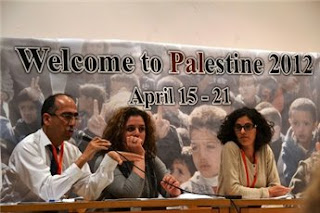Prisoners have the rights to see parents and read books
By Daoud Kuttab
I knew, separately, Suheir Ismael and Najeeb Farraj before they became
a couple. I knew Najeeb as a colleague working with AFP and Al Quds
daily, and an avid reader of the political scene in Palestine. I worked
with Suheir when we produced the documentary Palestinian Diaries during
the first Intifada. In it, Suheir talks about the day her brother was
killed by Israelis while he was trying to help a neighbour in Al Khader
village, near Bethlehem.
With her brother gone and her father killed in Lebanon, Suheir grew up
a strong woman fighting for her rights in a male-dominated society.
I will never forget the day she interviewed her mother for the
documentary, asking her a tough question: Why didn't you follow dad
into exile? She later told me that the camera gave her the courage to
ask a question she had not dared ask face-to-face.
Another documentary I co-produced documents her wedding day and
includes a segment in which distant male relatives try to take
advantage of her men-less family, only to be put down by Najeeb's
brother Hamdi, a leading Palestinian columnist.
Suheir moved to Najeeb's home in Dheisheh camp and continued to work in
filmmaking, set up a media NGO that trains women filmmakers. She and
Najeeb have also produced a lovely family.
When they were gifted with a son, they called him Ismael, in memory of
Suheir's dead brother. The name has given the young boy some trouble,
as it matches the name of the deputy head of the Palestinian
intelligence service, Ismael Farraj (who is Najeeb's older brother).
The young Ismael, however, seems to have adopted points of view a
little to the left of those of his pro-Fateh uncle. His leftist
ideology has also incurred the wrath of the Israelis.
Described by friends and family as smart, clever and charismatic, the
young Ismael Farraj became a supporter of the PLO's left-wing faction
Popular Front for the Liberation of Palestine. At Al Quds University,
where Ismael is a second-year law student, he became involved in the
PFLP's student movement. As any active student, he would help with
public events on and off campus.
Last October, Israeli soldiers sneaked into areas under Palestinian
security rule and broke into the Farrajs' home, in Dheisheh camp and
arrested young Ismael. He was charged with belonging to an illegal
organisation.
Although the PFLP is part of the PLO, which has signed a memorandum of
understanding with Israel in 1993, Israel has not removed the
organisation from their long list of organisations it considers
terrorist.
Ismael is also accused of having prepared chairs for public events and
inciting people to throw stones. He, himself, is not accused of any
violent act.
Since October 10, Ismael has been held at the Ofra detention facility
near Ramallah. This is the first time Ismael was detained. His parents
are banned from seeing him. No official explanation is given for this
ban. Only his siblings, Lamis 17 and Ruba 14, are allowed to see him.
What is most upsetting to Ismael and his family is the relatively new
Israeli policy (under Premier Benjamin Netanyahu) that bans books from
prisons or detention centres. Israelis are allowing only three books
per year, and of those, only textbooks.
This week, Ismael, who was brought to a hearing, told his family that
he wishes they could get him a world atlas, which apparently is allowed
under this weird textbook policy.
Palestinians are also prevented from pursuing education in prison,
including the ability to apply for the Tawjihi matriculation test and
for college education.
Palestinian prisoners have declared a prison-wide hunger strike. It
began with 1,200 prisoners demanding basic rights, such as family
visits (those with family in Gaza have not seen relatives since 2007),
the ability to touch and hug children and family members and to apply
for high school and college degrees, as well as have regular books
brought in. They are also calling for an end to administrative
detentions.
Israel violated international law when it transferred Gaza prisoners to
Israel and has continued to flaunt international humanitarian law by
preventing prisoners, since June 2007, to see their families. Barring
parents also seems to be used as an unauthorised punishment, as in
Ismael's case.
It might help if international celebrities like George Clooney ,
Angolina Jolie and Richard Gere who have championed world issues would
also champion these basic rights of Palestinians including that of
family visits and the right of a parent even in prison to hug their
children during visits.
It would be commendable to see Nobel Literature laureates sign a
statement calling on Israel to stop the policy of banning books for
Palestinian prisoners.
It would be great if universities around the world and academics would
push Israel to allow prisoners to take the high school examination and
enroll in distance college education.
It would be great if Jewish religious and secular leaders whose history
and culture highlight the importance of books and being a light unto
nations would protest denial of books to Palestinian prisoners.
One might disagree with the cause of the conflict or the reasons for
jailing people, but even prisoners have their rights protected and
safeguarded by international law and basic common sense.
Ismael's father expects his son to be sentenced to about two years. The
big question, however, for Ismael and all other prisoners, is what will
happen once they end their prison term and what will they think of how
the world acted when they were being punished.






























